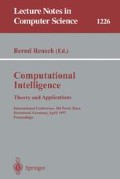Abstract
In this paper, the well-known indistinguishability problem of real numbers is addressed. It is explained that T-equivalences form a suitable mathematical model for dealing with this problem. Firstly, it is shown that, for a continuous Archimedean t-norm T with additive generator f, from any pseudometric a T-equivalence can be constructed, by applying the pseudo-inverse of f. Secondly, a particular pseudo-metric d g on ℝ is constructed from a scale or generator g. It is investigated how this pseudo-metric can be transformed into a T-equivalence on ℝ. The answer lies in the study of the T-idempotents of the T-addition of fuzzy numbers. It is explained that by suitably modelling ‘fuzzy zero’, the pseudo-metric d g allows to propagate this ‘indistinguishability from O’ across the real line, thus obtaining a description of indistinguishability of real numbers in general.
Preview
Unable to display preview. Download preview PDF.
References
B. De Baets, M. Mareš and R. Mesiar, T-partitions itof the real line generated by idempotent shapes. Fuzzy Sets and Systems (submitted).
B. De Baets and R. Mesiar, T-partitions, Fuzzy Sets and Systems (to appear).
B. De Baets and R. Mesiar, Pseudo-metrics and T-equivalences, J. Fuzzy Mathematics (to appear).
B. De Baets and R. Mesiar, Metrics and T-equalities, J. Math. Anal. Appl. (submitted).
U. Höhle, Fuzzy equalities and indistinguishability, Proceedings of the First European Congress on Fuzzy and Intelligent Technologies (Aachen, Germany, September 1993) (H.-J. Zimmermann, ed.), vol. 1, 1993, Aachen, pp. 358–363.
J. Jacas and J. Recasens, Fuzzy numbers and equality relations, Proceedings of the Second IEEE International Conference on Fuzzy Systems (San Francisco, California, March 1993), 1993, pp. 1298–1301.
F. Klawonn and R. Kruse, From fuzzy sets to indistinguishability and back, Proceedings of the First ICSC International Symposium on Fuzzy Logic (Zürich, Switzerland, May 1995) (N. Steele, ed.), ICSC Academic Press, 1995, pp. A57–A59.
E.-P. Klement, R. Mesiar and E. Pap, Triangular norms, (in preparation).
M. Mareš, Computation over fuzzy quantities, CRC-Press, Boca Raton, 1994.
M. Mareš, Fuzzy zero, algebraic equivalence: yes or no?, Kybernetika 4 (1996), 343–351.
A. Marková, Idempotents of the T-addition of fuzzy numbers, Tatra Mountains Math. Publ. (to appear).
A. Marková-Stupñanová, Idempotents of the addition of fuzzy intervals based on a continuous t-norm, Fuzzy Sets and Systems (submitted).
H. Poincaré, La science et l'hypothèse, Flammarion, Paris, 1902.
H. Poincaré, La valeur de la science, Flammarion, Paris, 1904.
E. Ruspini, A new approach to clustering, Information and Control 15 (1969), 22–32.
B. Schweizer and A. Sklar, Probabilistic metric spaces, North-Holland, New York, 1983.
E. Trillas and L. Valverde, An inquiry into indistinguishability operators, Aspects of vagueness (H. Skala, S. Termini and E. Trillas, eds.), Reidel, Dordrecht, 1984, pp. 231–256.
Author information
Authors and Affiliations
Editor information
Rights and permissions
Copyright information
© 1997 Springer-Verlag Berlin Heidelberg
About this paper
Cite this paper
De Baets, B., Mareš, M., Mesiar, R. (1997). Fuzzy zeroes and indistinguishability of real numbers. In: Reusch, B. (eds) Computational Intelligence Theory and Applications. Fuzzy Days 1997. Lecture Notes in Computer Science, vol 1226. Springer, Berlin, Heidelberg. https://doi.org/10.1007/3-540-62868-1_122
Download citation
DOI: https://doi.org/10.1007/3-540-62868-1_122
Published:
Publisher Name: Springer, Berlin, Heidelberg
Print ISBN: 978-3-540-62868-2
Online ISBN: 978-3-540-69031-3
eBook Packages: Springer Book Archive

